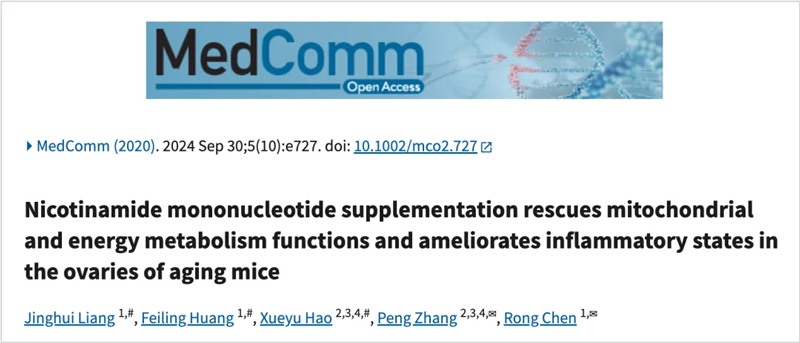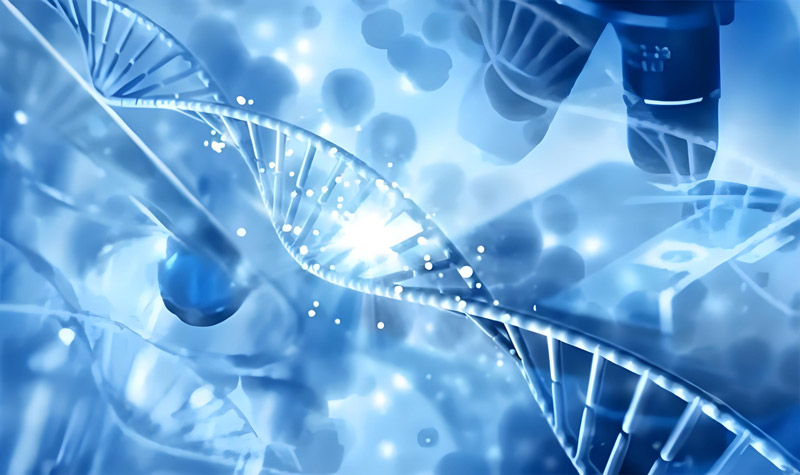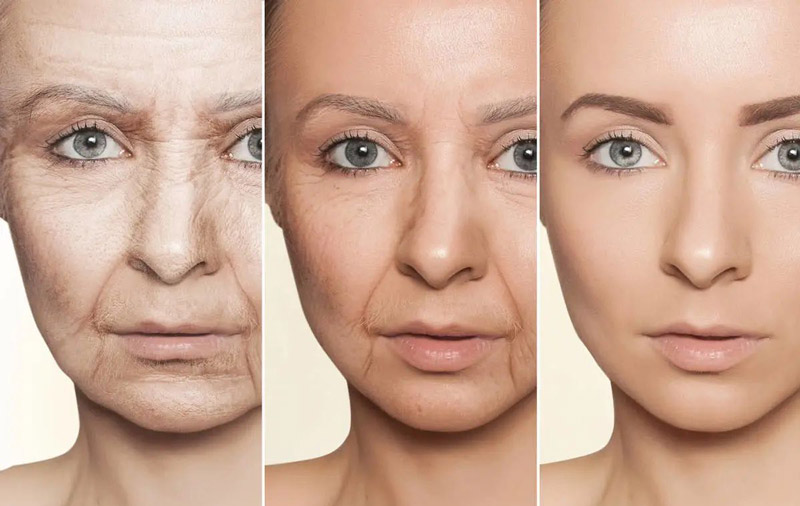Among the results of the 2024 NMN study, the breakthrough in the field of "ovarian health" is a highlight.
A key study jointly released by Peking Union Hospital, Chinese Academy of Medical Sciences and Beijing Children's Hospital, Capital Medical University, shows that:
NMN has the ability to significantly improve ovarian mitochondrial function and energy metabolism in aging mice, effectively reduce ovarian inflammation, and successfully reverse ovarian aging.
What does ovarian aging mean?
In addition to reproductive functions, the ovaries also play a vital role in maintaining hormonal balance, regulating the menstrual cycle and regulating metabolic levels, which are closely linked to the overall health of the human body.
Because of this, the effects of ovarian aging are widespread and multi-dimensional. With the increase of age, ovarian function gradually declines, and the quantity and quality of egg reserves will suffer negative impacts, which will affect fertility.
Generally speaking, female fertility reaches its highest level around the age of 24, begins to decline from the age of 30, and shows an accelerated decline after the age of 37, which is directly related to the continuous deterioration of ovarian function.
Not only that, but aging of the ovaries interferes with the normal functioning of the endocrine system, which can lead to a host of problems, including disrupted menstrual cycles, reduced metabolic levels (manifested by a tendency to gain weight), osteoporosis, increased risk of cardiovascular disease, and worsening skin conditions.
The ovary, as a complex organ, is made up of many different types of cells, each of which has its own job and performs a specific function. The aging process of these cells is affected by a combination of factors.
Nicotinamide adenine dinucleotide (NAD+), as a key coenzyme in cells, is deeply involved in the regulation of energy metabolism, protection from oxidative damage and regulation of inflammatory response.
With the increase of human age, the content of NAD + in the body shows a downward trend, which is widely regarded as one of the important causes of aging.
With all this in mind, a key question arises: Can restoring NAD + levels in the body be an effective strategy against ovarian aging?
Increase NAD+ levels and reverse ovarian aging
The team measured NAD+ levels in mice at 2, 8, 10 and 12 months of age, and the results clearly showed that NAD+ levels in the ovaries did indeed decline with age.
As a direct precursor of NAD+, NMN has the ability to safely and effectively increase the level of NAD+ in the body.
On this basis, the research team used two different methods to evaluate the effect of NMN on ovarian function and health in mice: one was a short-term intraperitoneal injection of NMN for 10 days, and the other was a diet supplemented with NMN for up to 8 weeks.
The final results show that even short-term NMN supplementation can significantly increase the level of NAD+ in the ovary, effectively inhibit ovarian atrophy, and also improve the quality of oocytes in elderly mice.

Ovarian NAD+ levels decline with age (A)
Ovarian NAD+ levels significantly increased after short-term NMN supplementation (C)

The black arrows indicate oocyte abnormalities, and NMN significantly reduced oocyte abnormalities in older mice
The study set up a young group (2-month old mice), an old group (12-month old mice) and an elderly group taking NMN for control experiments.
The results showed that long-term supplementation of NMN could improve the anti-aging ability of elderly mice, improve their overall health, and enhance their ovarian function.
The research team selected serum hormones, antioxidants and inflammatory factors as evaluation indicators for detection and analysis, and found that NMN helps to maintain the stable state of hormones, reduce the level of oxidative stress, reduce the production of inflammatory factors, and then show a significant anti-aging effect.

NMN restored many indicators of aging to youthful levels in older mice
By comparing sections of the ovaries of young, old, and old mice treated with NMN, the health of the ovaries in the old and NMN group returned to the state of youth.
The expression of the aging marker protein P21 was highest in the older group, while the older group taking NMN was closer to the level at a younger age.
These results suggest that NMN can inhibit the expression of aging markers and reverse ovarian aging.

From left to right: young group, old group, old +NMN group
The number of ovarian follicles in aging mice increased significantly.
After NMN supplementation, lipid droplets and mitochondria in ovarian granulosa cells changed significantly in terms of density, morphology and distribution, and these changes played a positive role in promoting the development and maturation of follicles.
Mechanism of ovarian anti-failure of NMN
In the process of in-depth exploration of its internal mechanism, the study revealed that the remarkable effect of NMN on ovarian failure is achieved by strengthening mitochondrial efficiency, optimizing energy metabolism and reducing the degree of inflammation.
A careful comparison of the differences in gene expression shows that:
Compared with the ovaries of young mice, the ovaries of old mice showed up-regulated expression of genes related to inflammation, which undoubtedly increased their immune burden.
At the same time, the ovaries of older mice showed a decline in the expression of genes closely associated with DNA damage repair, cell signaling, cell cycle, and metabolic pathways, clearly indicating a decline in these key functions.
After long-term NMN supplement intervention, mitochondrial function and energy metabolism of elderly mice have been effectively improved, ovarian inflammation has been alleviated, and important functions such as cell growth and proliferation have also been benign regulated, providing a valuable reference basis and a new research direction for ovarian anti-aging research.
Related research supplement
This is not the first time NMN has shown an effect against ovarian aging.
Two studies in 2021 found that NMN can increase NAD+ levels, repair mitochondrial function, and protect oocyte quality from degradation caused by environmental pollutants; Long-term use of NMN can also improve endocrine function and may save the loss of ovarian reserve.
In a study published in Cell Proliferation in 2022, NMN helped prevent metabolic abnormalities caused by a high-fat diet (HFD) and improved ovarian quality in mice.
According to a study published in PLOS ONE in 2023, NMN significantly improves oocyte senescence in large animals and can promote subsequent embryonic development.
In a study published in the Journal of Ovarian Research in 2024, NMN has anti-inflammatory effects that promote ovarian health and improve premature ovarian failure.
References:
1. Nicotinamide mononucleotide supplementation rescues mitochondrial and energy metabolism functions and ameliorates inflammatory states in the ovaries of aging mice. DOI: 10.1002/mco2.727
2. Nicotinamide Mononucleotide Restores the Meiotic Competency of Porcine Oocytes Exposed to Ethylene Glycol Butyl Ether. DOI: 10.3389/fcell.2021.628580
3. Long-term treatment of Nicotinamide mononucleotide improved age-related diminished ovary reserve through enhancing the mitophagy level of granulosa cells in mice. DOI: 10.1016/j.jnutbio.2021.108911
4. Administration of nicotinamide mononucleotide improves oocyte quality of obese mice. DOI: 10.1111/cpr.13303
5. β-nicotinamide mononucleotide rescues the quality of aged oocyte and improves subsequent embryo development in pigs. DOI: 10.1371/journal.pone.0291640
6. Nicotinamide mononucleotide improves the ovarian reserve of POI by inhibiting NLRP3-mediated pyroptosis of ovarian granulosa cells. DOI: 10.1186/s13048-024-01534-w






